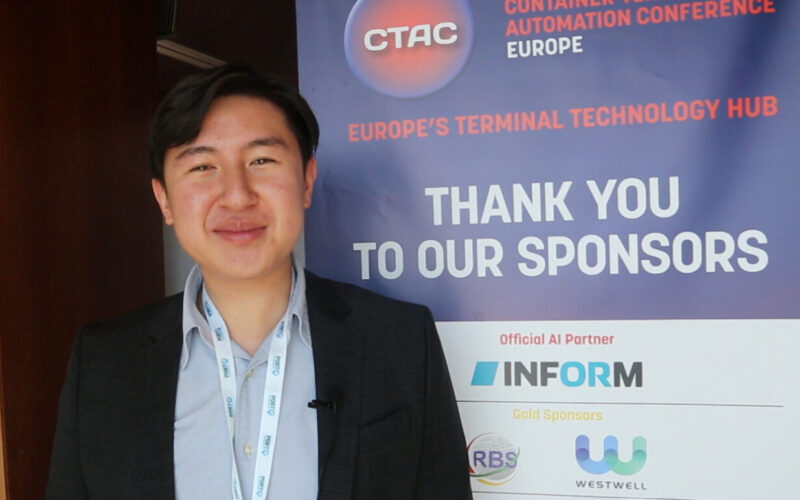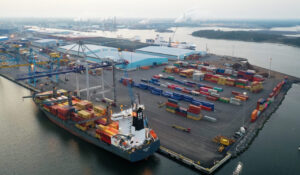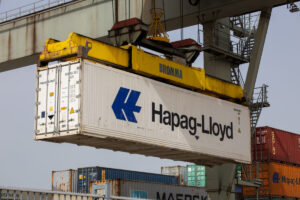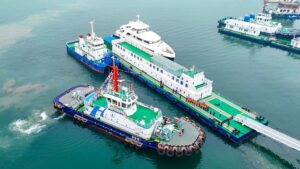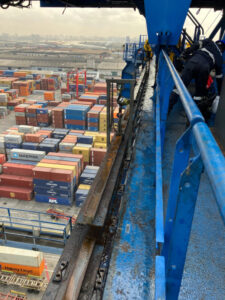During PTI’s latest Container Terminal Automation Conference (CTAC) in Valencia, Dom Magli, Staff Reporter at PTI, interviewed Harrison Nguyen, Account Executive at Realtime Business Solutions (RBS). The conversation centred around automation, Artificial Intelligence (AI), port auditing, and maritime workers’ safety. Nguyen also discussed RBS’s ambitions for the remainder of 2024, promoting upcoming projects and initiatives.
What are the steps that RBS is taking to drive automation and digitalisation?
HN: Automation and digitalisation have always been part of our DNA. We are always trying to innovate with new technologies. Currently, we are in our fourth version of the system, and with each system we create an entirely new way of doing things that meets the changing requirements of ports.
Of course, included in that are the products that aid in automation, and we were one of the first Terminal Operating System (TOS) providers to implement a system that can accommodate automatic equipment, especially with Automated RTGs (ARTGs). With our latest product, TOPX Intelligence 3D, we are trying to encourage digitalisation and automation in ports, and with that, we have preventative and predicted functions in the new system that can optimise and further improve the automatic equipment.
What is the impact that RBS believes AI will have on port and terminal operations?
HN: AI is definitely something that can have a massive impact on ports and terminals as there’s so much data these days to be analysed and used to make optimal decisions. If done correctly, it can improve the way terminals operate and execute their plants.
AI in general is gaining traction as more people develop interesting and intelligent tools that help with these kinds of problems. However, I think the main point when it comes to AI is what exactly the type of data it is using. Currently, there are a lot of AI products that use old or historical data, and when you are talking about doing operations now and making decisions for now, you need data that’s coming from real-time and from now. That is a really important point I think to make when considering AI.
Terminals and container terminals around the world are the perfect environments for this specifically because of the way that it constantly receives information and data from shipping lines, from the tasks, and from all these different types of systems, and that makes it a great platform to use real-time data in AI.
Furthermore, computational power is increasing at a super rapid rate, every three to four months I believe it doubles. With this, you really have more capabilities to use AI in specific functions, and overall, I think with this ability to process and learn through data, we can create operations and processes that will be optimised in the future.
READ: Egyptian new dry port relies on RBS designed TOS
What common flaws do RBS find when auditing ports and terminals that want to implement automation?
HN: That’s a great question. I’m going to speak from a software point of view because RBS is a TOS provider, and we specialise in software. In my opinion, many of the ports and terminals that use audit automatic equipment also go for middleware software to optimise and control their automatic equipment, and from my perspective, that leads to a lot of inefficiencies.
If you have a middleware between the TOS and the actual execution, what you end up with is the data and the calculations are not always real-time. The idea I like to give is the hand and the brain. The TOS is like the brain and the equipment is like the hands. If the brain tells the hands exactly what to do, everything is nice and easy; but if your brain tells another person to move your hands, in the end, the actual movement is very complicated and often wrong.
That’s why you see a lot of ports around the world with the movements not always being optimised, and efficiency is not as high as manual terminals in general. Now, the whole point of automation is to optimise your operations and lower your OPEX. It does lower OPEX in a lot of cases, but with the efficiency, it still has some ways to get there. So, I think if you have a solution on the software side that can manage it directly from the TOS, which is what RBS does very successfully in a few places, then you’ll be able to get optimal results.
How can automation help ensure workers’ safety?
HN: With worker safety, I think the most obvious way in which automation can help is the reduction of interactions between humans and machines. The most common problems you see at terminals always occur when there are humans around heavy machinery that may have malfunctioned. If you can reduce that interaction, then you obviously improve the safety and overall, limit the amount of accidents that happen.
READ: Industry Q&A: Realtime Business Solutions (RBS)
What are RBS’s ambitions for the remainder of 2024?
HN: For 2024, the big one we’re releasing this year is our new product called TOPX Intelligent 3D. It is what we presented here at CTAC Europe 2024, and it is a super-intelligent digital twin. It encompasses all the latest technologies in AI, machine learning, and preventative management, and what it does is it takes all the problems of your terminals and actually solves them. This is a completely new concept in the terminal operation world. Furthermore, it’s a system that will be able to sit on top of any other TOS, so it’s open to interface with all different types of systems, and this way it allows for the fastest and easiest implementations at all the different terminals to provide the greatest operational benefits.
As for some other things we have planned for 2024, we’re also moving into general cargo and RoRo systems that will be finished developing mid-year. Beyond that, we’ll also do the digital twin and super intelligent digital twin of those systems as it moves forward this year. At the end of 2024, we’re going to cover all the needs of terminal operations from billing to VBS to general cargo. Anything you think about terminal operation, RBS will be able to offer it.
This month, RBS announced a TOS upgrade to the Klaipedos Smelte container terminal in Lithuania.

Harrison Nguyen is an Account Executive at Realtime Business Solutions (RBS) and is passionate about how software can revolutionise industries. He graduated from the University of New South Wales with a Bachelor of commerce and computer science with distinctions. With his fresh ideas and burning ambition, Harrison is dedicated to helping terminals find the best solutions to optimise their operations.

